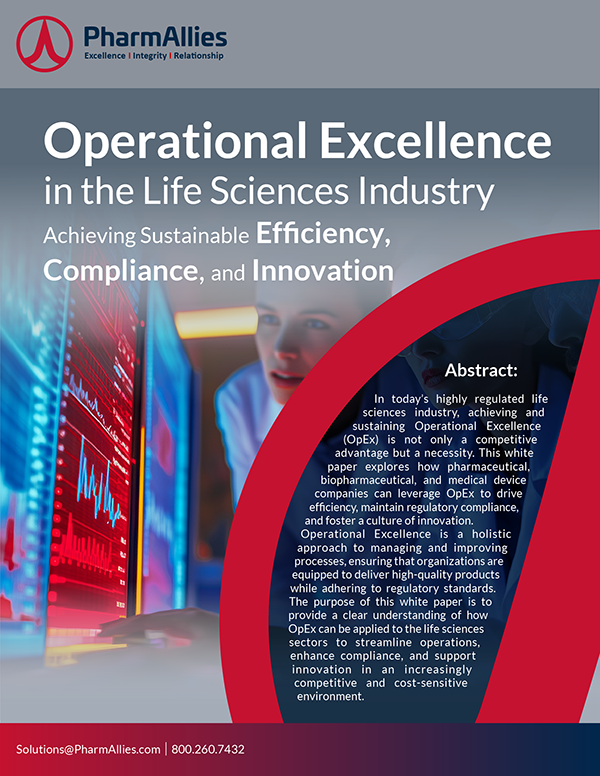The Role of Leadership in Driving Operational Excellence in Life Sciences
Introduction
Operational Excellence (OpEx) is crucial in the life sciences industry to ensure high standards of quality, regulatory compliance, and efficiency. But achieving OpEx isn’t just about adopting tools and processes, it’s about leadership. Strong leadership is the driving force behind a culture that prioritizes quality, collaboration, and continuous improvement. As a leader, you have the power to inspire and guide your teams toward sustained success, creating an organization that thrives in a competitive, highly regulated environment.
This article explores your essential role in fostering OpEx, from creating a culture of accountability to equipping your teams with the training and tools they need. By taking an active role in OpEx initiatives, you can lead your organization to deliver better outcomes, ensure compliance, and achieve meaningful, lasting improvements.
Why Leadership is Essential for Operational Excellence
1. Setting the Vision and Strategic Goals
You are responsible for defining the vision and setting clear goals for OpEx that align with your organization’s mission. In life sciences, where compliance and quality are non-negotiable, your leadership ensures that OpEx initiatives support regulatory adherence while driving innovation and operational efficiency. A clear vision helps your team stay focused on what matters most, delivering high-quality outcomes while meeting regulatory requirements.
2. Building a Culture of Continuous Improvement
Creating a culture of continuous improvement starts with you. By championing a mindset of incremental, ongoing enhancements, you empower your team to take ownership of processes and find new ways to improve. This culture fosters collaboration and accountability, ensuring that everyone feels responsible for driving quality and efficiency at every level.
3. Ensuring Regulatory Compliance
In life sciences, compliance isn’t optional. As a leader, you play a vital role in embedding compliance into every aspect of operations. By aligning OpEx initiatives with regulatory standards like Good Manufacturing Practices (GMP) and FDA guidelines, you help prevent costly deviations, recalls, or audit failures. Your proactive approach to compliance strengthens trust and ensures that patient safety remains a top priority.
4. Driving Engagement and Accountability
Your involvement in OpEx initiatives fosters a sense of ownership and accountability among your team. When you engage employees in decision-making, goal-setting, and improvement efforts, you boost morale and productivity. This engagement not only improves operational outcomes but also builds a workforce that’s motivated and aligned with your organization’s goals.
Key Leadership Strategies for Driving Operational Excellence
1. Establish a Clear Vision and Communicate the Importance of OpEx
You need to articulate a compelling vision for OpEx and consistently communicate its importance to your team. When everyone understands how their work contributes to the bigger picture, they’re more motivated to achieve excellence.
How to Apply It:
- Define Specific Goals: Set measurable objectives like reducing production cycle times or improving compliance scores.
- Communicate Regularly: Share the vision for OpEx through team meetings, newsletters, or internal events to keep the focus on quality and efficiency.
- Tie OpEx to Core Values: Emphasize how OpEx initiatives align with organizational values like patient safety and innovation.
Outcome: A shared vision that motivates your team to pursue continuous improvement and deliver consistent results.
2. Empower Teams with Tools, Training, and Resources
Your team needs the right tools, training, and resources to succeed in OpEx initiatives. By investing in their development, you enable them to contribute effectively to quality and efficiency improvements.
How to Apply It:
- Provide Training Programs: Offer courses in Lean, Six Sigma, and Kaizen to equip your team with proven methodologies for process improvement.
- Invest in Technology: Implement digital tools, such as IoT sensors, data analytics platforms, and real-time dashboards, to monitor and optimize performance.
- Encourage Certification: To deepen their expertise, support team members in earning certifications like Lean Six Sigma Green or Black Belts.
Outcome: A skilled, empowered workforce that drives operational improvements and supports a culture of excellence.
3. Foster a Culture of Accountability and Recognition
Accountability starts with you. By setting clear expectations and recognizing achievements, you can cultivate an environment where your team takes ownership of quality and improvement efforts.
How to Apply It:
- Set Performance Metrics: Define specific roles and responsibilities related to OpEx, ensuring everyone knows their contribution.
- Implement Recognition Programs: Celebrate OpEx successes through awards, financial incentives, or public acknowledgment.
- Encourage Peer Recognition: Create opportunities for team members to recognize each other’s contributions, building a supportive environment.
Outcome: A motivated team that takes pride in delivering quality and driving continuous improvement.
4. Lead by Example: Model OpEx Principles in Daily Work
Your actions set the tone for your organization. By modeling a commitment to quality, efficiency, and improvement, you inspire your team to follow suit.
How to Apply It:
- Engage in CI Activities: Participate in continuous improvement initiatives like Kaizen events to demonstrate your commitment.
- Use Data-Driven Decisions: Lead by example by using data to guide problem-solving and decision-making.
- Share Lessons Learned: Be transparent about successes and challenges to foster an open culture of learning.
Outcome: A leadership team that exemplifies OpEx values, inspiring employees to embrace a culture of quality and accountability.
5. Encourage Cross-Functional Collaboration and Knowledge Sharing
OpEx thrives when departments collaborate. Promoting cross-functional teamwork can enhance the effectiveness of improvement initiatives.
How to Apply It:
- Create Cross-Functional Teams: Collaborate on OpEx projects by bringing together representatives from R&D, quality, manufacturing, and compliance.
- Facilitate Knowledge Sharing: Use collaborative platforms to share best practices, lessons learned, and updates across teams.
- Host Regular CI Meetings: Schedule routine meetings to discuss challenges, share successes, and brainstorm new ideas for improvement.
Outcome: A collaborative, interconnected organization that benefits from diverse expertise and perspectives.
Benefits of Strong Leadership in Operational Excellence
When you lead with a focus on OpEx, you unlock a range of benefits for your organization and team:
- Enhanced Compliance: Embed quality into daily operations to reduce risks associated with audits or recalls.
- Improved Efficiency: Eliminate inefficiencies and streamline processes, reducing costs and enhancing productivity.
- Higher Employee Engagement: Create a motivated workforce that’s aligned with organizational goals.
- Better Patient Outcomes: Ensure quality and compliance efforts prioritize safety and efficacy.
- Sustained Competitive Advantage: Foster innovation and adaptability to stay ahead in a demanding industry.
Conclusion
Operational Excellence requires more than just tools and processes, it demands strong, committed leadership. Your ability to set a vision, empower your team, and model OpEx principles directly influences the success of your initiatives. By fostering accountability, encouraging collaboration, and investing in the right resources, you can create a high-performing organization that consistently delivers quality and compliance.
As a leader, you have the opportunity to inspire your team to achieve excellence and create a culture where continuous improvement becomes second nature. By aligning OpEx with your organizational values and championing its importance, you pave the way for lasting success in the life sciences industry.
Are you ready to lead the way in Operational Excellence? Start building a culture of quality, collaboration, and continuous improvement today.
Want to learn more about Operational Excellence (OpEx) in the Life Sciences industry?
Follow us on LinkedIn and Download PharmAllies’ White Paper on Operational Excellence (OpEx) in the Life Sciences Industry.
Download the White Paper HERE

Discover how Operational Excellence drives efficiency, compliance, and innovation in life sciences with PharmAllies’ latest white paper.


